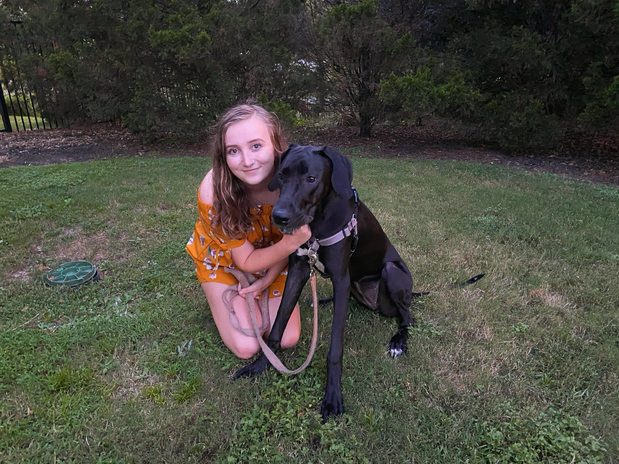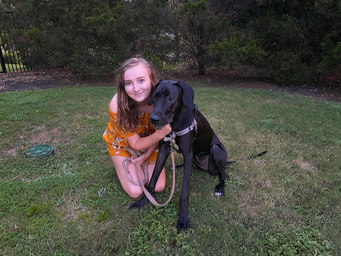This week, I interviewed my good high school friend, Morgan O’Neil, who bought her gorgeous Great Dane puppy, Koda, earlier this year. Unbeknownst to Morgan, Koda would come to suffer from mental health issues that have little medical/psychological research conducted. Further, the treatment avenues that Morgan can pursue to help Koda are very limited, and only include training for the first few years, and maybe prescription medication when she is older. Left with few options, Morgan discusses her experience within the industry and how she is working to provide a better life for her best friend.
Her Campus (HC): Tell me a little about what it’s like having a dog in general while being a college student.
Morgan O’Neil (MO): It’s a lot of responsibility. You need to make sure you have a consistent income to cover all the medical/vet expenses like spay and neuter, flea and tick prevention and for Great Danes specifically, gastropexy operations. Great Danes go through food like crazy since they’re huge and treats, crates, high-quality bones and toys when they’re puppies. It’s definitely a lot and adds up quickly, so you need to make sure you have a stable income and a lot of time.
HC: Is it hard to find apartment complexes that accept pets, specifically Great Danes?
MO: Most complexes either charge a fee per month or per year for pets. My complex now charges $25 a month, or they have size limits which Great Danes will go over every time. She was free for me since she’s an emotional support animal so all the restrictions are excused.
HC: So she’s an ESA (Emotional Support Animal) for you? But she has issues also?
MO: Yeah she is, I know the irony.
HC: What are her conditions officially, and how did you first start to notice them?
MO: She hasn’t been officially diagnosed with anything because of her age, but we know that she most likely has a generalized anxiety disorder. I’ve even had some trainers say that it could potentially be autistic behavior. However, canine autism hasn’t had enough research done, so it’s not really a diagnosable condition yet, but it manifested in similar ways that autism does in children.
HC: So you started taking her to trainers when you noticed all that?
MO: I actually started taking her to trainers immediately. I’m not new to having dogs, but I’ve never noticed anything like this. My first trainer was for socialization, so just so I could bring Koda around other trusted dogs and expose her to them, and that was when I initially started noticing that she was petrified of other dogs and hesitant towards people. Then, my second trainer was to work on leash training since she would get really stressed and overwhelmed with being outside. She suggested we get a choke collar, so I called her and just said I wasn’t interested anymore in continuing her training. Especially knowing Koda has some fear issues, it wasn’t something I was willing or interested in doing. Then, I consulted another trainer and each time you seek out a more specialized and certified trainer they get more expensive, but I really didn’t think at this point that it would be a hard thing to fix. I just didn’t know. This trainer was the first one to kind of diagnose her with generalized anxiety and explained that a lot of the symptoms manifest similar to autism and kind of work around the issue instead of fixing it long term. Then, I consulted a more expensive trainer, but nothing she told me was anything new or helpful. So I talked to the vet about medication and consulted her regarding anti-anxiety medication, but she wasn’t comfortable since Koda is so young; unless we saw a behaviorist, which I quickly realized that was very expensive. There are only about 80 licensed behaviorists in the entire world, so it’s a very niche thing. I knew, on my college student budget, that I couldn’t afford a consultation, let alone the treatment, so I considered rehoming and contacted some rescues. Ultimately that didn’t work out, so here we are, thousands of dollars later, and it ended up kind of being a waste of time until she’s older.
HC: You’re considering using CBD and other practices you learned from training, but what’s your plan for the both of you?
MO: I just have to wait it out and do what I can to make her feel as comfortable as possible. So, just like not really having guests over, making sure she gets attention and keeping her relaxed. We’ll just see how it goes until she’s old enough to get medication.
HC: What would be your advice for anyone considering getting a dog and maybe help them visualize the risks?
MO: The issue is that you can never really know. Her breeder didn’t even know, but make sure you do your research and have a good breeder, or rescue, and that way you know more medically about what you’re walking into. I think it’s important when you’re considering getting a puppy that you take into account that this is something that can happen, and if it’s not something that you’re able to give a lot of your financial and emotional efforts to, then you should reconsider getting a dog.
Want to see more HCFSU? Be sure to like us on Facebook and follow us on Instagram, Twitter and Pinterest!



